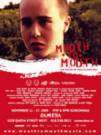|
|
||||
|
|
by Donald Levit  Director/writer Alison Murray cites Orwell’s Animal Farm as inspiration for exploring the fine line between politics and human nature in her first, “semi-autobiographical feature,” Mouth to Mouth, but her press statements are more concerned with “youth, . . . my favorite thing in the film, a love story, . . . my own disillusionment with ‘alternative lifestyles.’” Sometimes creator and creation are too close for the former to judge what she/he has, in fact, done. While this story is about willfully homeless street youth and, more, their emotionally programmed need for community and belonging, the unintentional ramifications dig deeper. The former, the vehicle or tale, is a bit too diluted and occasionally loses itself, but the tenor, or implication, stays. That is, what does linger is a taste of the drive to the ego-trip aphrodisiac of power, domination over less strong natures. Coming from training in dance and theater, thence to shorts and television documentaries, Murray has the beginner’s fault of over-orchestrating and, in this case, choreographing too much, although Blade’s (Jefferson Guzman) early-on sorrow dance of death with child Manson’s (Elliott McCabe-Lokos) corpse, does stand out. The heavy-rock score serves as appropriate background, but one gets tired of the too fashionable HD-16-to-35mm blowup graininess and color that runs back-and-forth between saturated and washed out, intended to give the feel of violently disaffected European youth. Punk-ish virgin Sherry Green (Ellen Page) up and runs away again from the London home inexplicably owned by her very young mother Rose (Natasha Wightman) and heads for Germany, there to be attracted, then attached, to the itinerant self-proclaimed social revolutionary group SPARK. Created in the The two always shirtless leaders are charismatic dark Harry (Eric Thal) and blond less assertive Tiger (August Diehl), and the plot would have been stronger had their hinted power and sex rivalry been developed. But the latter is allowed to disappear into the woodwork as a presence. To the fore come Blade, methadone dispenser and de facto mother nurse Dog (Diana Greenwood), unintelligible Brit-accented Nancy (Beatrice Brown) and, in a stretch, Rose, who arrives in a rented car seeking her runaway daughter and, for mixed motives, eventually sells the house, crops her hair and supposedly finds herself in total commitment to the commune. “Belonging,” as complete surrender, is what it’s all about. Masking his will to power behind the others’ sheep-like “votes” that follow his suggested lead, even to punishments, Harry imposes himself, while avoiding the physical labor to harvest grapes and bottle and box wine at the Iberian farm where they settle. Alternately harsh for the general good or understanding father, teasingly sexy or self-denying puritan, he basks in the glow, his falls from grace either forgotten -- with a sigh, Nancy recalls his past prowess -- or else someone else’s fault, as in lonely Sherry’s case. The credible rise of the dictator is here, dissipated and not realized by the filmmaker herself. But insecurity, or cock-sureness, historically and psychologically leads to overreaching, ratcheting the gears up one notch too high. As with fascist states that would control subjects’ minds through fear and a sense of contributing, the leader promulgates spying on and reporting one’s neighbors for deviations, an “honor system” that may even include false set-ups to test loyalty. Suspiciousness and the desire to ingratiate oneself for the reward of approval, complete the totalitarian circle. Things go too far for a few, however, and the loss of a life precipitates some small resistance, which becomes even smaller open rebellion. While the herd pulls back zombie-like, three will make a break for liberty. This is “the world [as it] looks to Sherry as she experiences it,” though it is naïve to agree that she is “totally alone but with her freedom and individuality intact.” For the experience must scar, and, in any case, the leader that she has seen, and not the young woman herself, is what remains. Points here for this unintentional center, if not for its cinematic presentation. (Released by Artistic License Films; not rated by MPAA.) |
||
|
© 2025 - ReelTalk Movie Reviews Website designed by Dot Pitch Studios, LLC |



